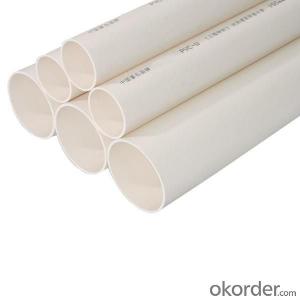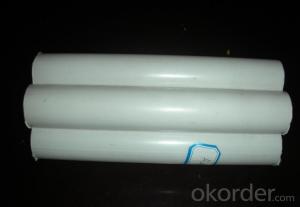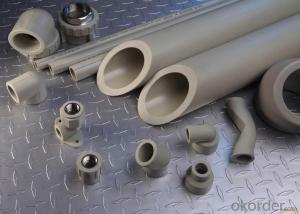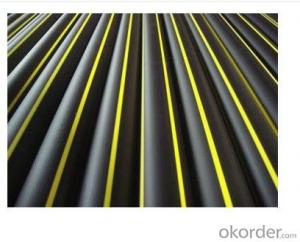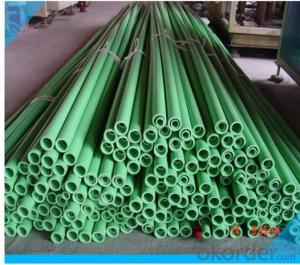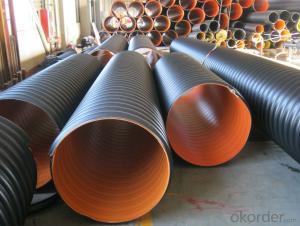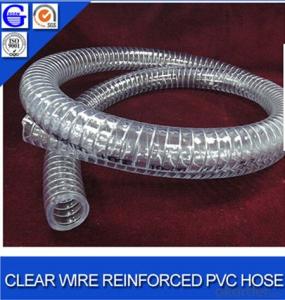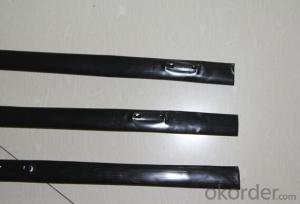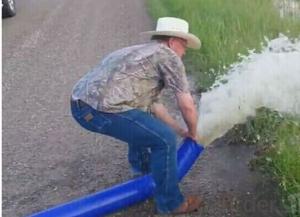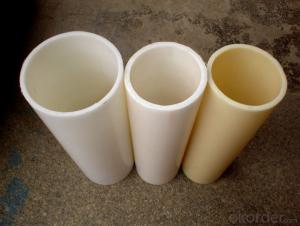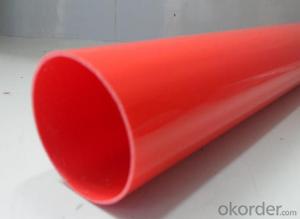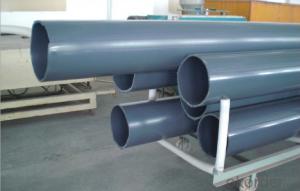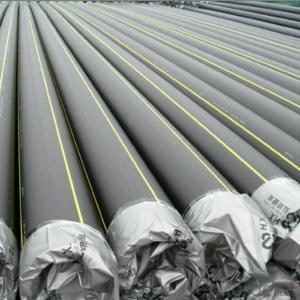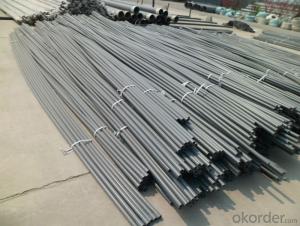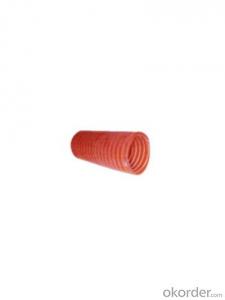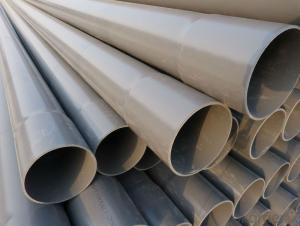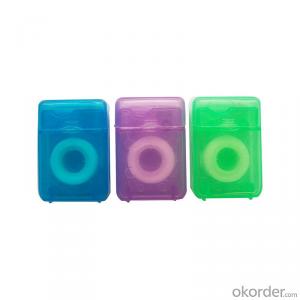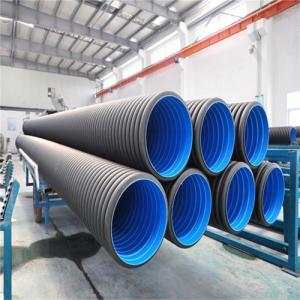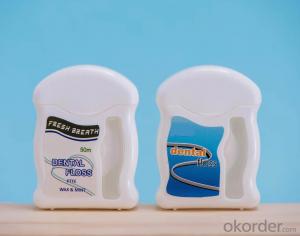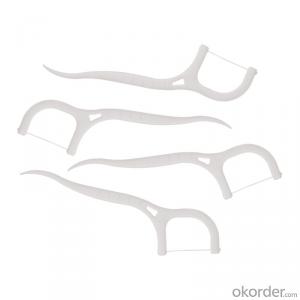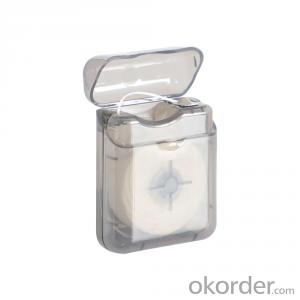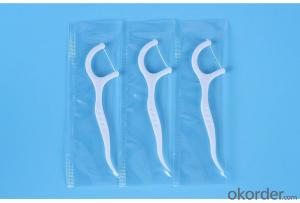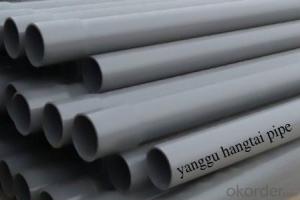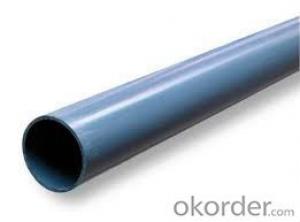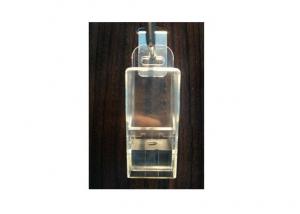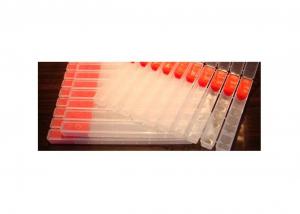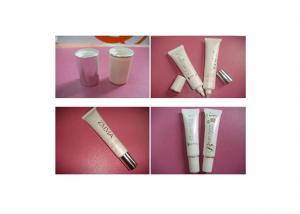PVC Pipe for Water Supply Environmental
- Loading Port:
- China main port
- Payment Terms:
- TT OR LC
- Min Order Qty:
- 1000 m
- Supply Capability:
- 100000 m/month
OKorder Service Pledge
OKorder Financial Service
You Might Also Like
1.Description of PVC Pipe :
Material: Virgin Rigid PVC resin, no recycle material
Process: vacuum forming extrusion
Color: various colors, we can make color according to Panton card No.
Quality Standard: Smooth surface, no spot, no shrink mark, no surface quality defect.Check from cross section, homogeneous in density, good plasticizing degree, relative chemical/physical property meet customer requirement. We supply different environment protection products to meet different market requirement.
2.Features of PVC Pipes :
1) Light weight, easy to load and unload: PVC pipe is very light, convenient to handle loading unloading, and installing.
2) Good chemicals and drugs resistance: PVC pipe has its excellent resistance to the erosion caused by acids and alkalines, a great help to the chemical industries.
3) Small resistance to fluidity: The smooth surface reduces resistance to the fluids. Its roughness coefficient is only 0.009, much less than other pipes, Under same discharges, smaller cabibre of the pipe can be uesd.
4) Strong mechanical strength: Good resistance to water pressure, outside impact and pressure, is satisfied under any conditions.
5) Good electrical insulation: excellent insulation nature against electricity. the pvc pipe can be served as conduits and pipes in construction cable and wire.
3.PVC Pipe Images:
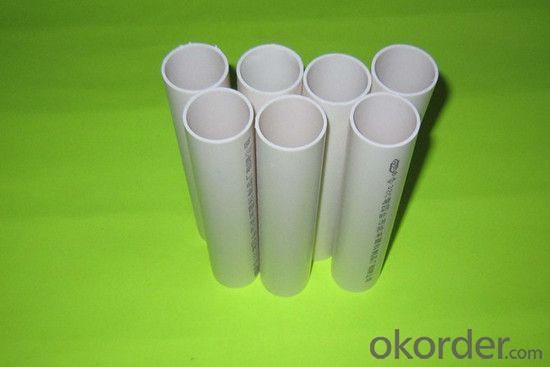
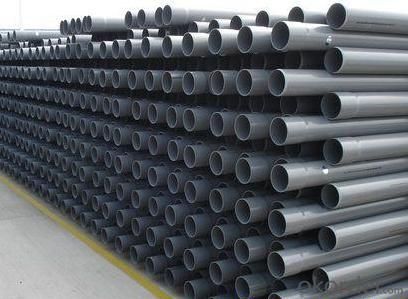
4.Specifications of the PVC Pipe:
1) Material: pvc pipe unplasticized polyvinyl chloride
2) Standard: GB, ISO9001, ISO14001
3) Color: white pvc pipe, grey pvc pipe , etc.
4) Specific Gravity:g/cm3, 20(C): 1.35 - 1.55
5) Vicat Softening Temperature: (C) >=79
6) Longitudinal Reversion: %, 150(C) <=5< span=""><>
7) Dichloromethane Resistance Test: No attack
5.FAQ
Q:What is you MOQ?
A:As customer’s request.
Q:What is the production ability? or delivery time?
A:Our production ability support 40HQ order finish in one week.
Q:What is the regular shipping port?
A:Tianjin or Shanghai.
Q:What is your payment?
A:TT or CC.
Q:Can we have sample?
A:Sample free, freight cost you.
- Q:Can plastic tubes be used for drainage systems?
- Yes, plastic tubes can be used for drainage systems.
- Q:What are the advantages of using plastic tubes in the medical industry?
- There are several advantages of using plastic tubes in the medical industry. Firstly, plastic tubes are lightweight and flexible, making them easy to handle and maneuver during medical procedures. Secondly, plastic tubes are transparent, allowing healthcare professionals to monitor fluid flow and detect any blockages or irregularities. Additionally, plastic tubes are biocompatible, meaning they are unlikely to cause any adverse reactions or infections in patients. Lastly, plastic tubes are cost-effective compared to other materials, making them a more affordable option for medical facilities.
- Q:Can plastic tubes be used for pool installations?
- Yes, plastic tubes can be used for pool installations. They are commonly used for the plumbing system of pools to transport water to and from the pool, as well as for other pool-related purposes such as drainage and filtration systems. Plastic tubes are lightweight, durable, and resistant to corrosion, making them a suitable choice for pool installations.
- Q:how do you get 2 pieces of plastic tube unstuck?
- Try this, make one end cold and the other end hot. The cold pipe will contract and the warm pipe will expand, making it easier to separate.
- Q:Do plastic tubes have any health risks?
- Yes, plastic tubes can pose health risks depending on the type of plastic used and the intended use of the tube. Some plastics contain harmful chemicals such as BPA (bisphenol A) or phthalates, which can leach into the contents of the tube and potentially cause health issues when ingested or absorbed by the body. Additionally, plastic tubes used in medical procedures or surgeries can carry the risk of infection if not properly sterilized or if they are made from low-quality materials. It is important to consider the specific plastic composition and usage guidelines when assessing the potential health risks of plastic tubes.
- Q:What are the different sizes available for plastic tubes?
- There are various sizes available for plastic tubes, ranging from small diameters like 1/8 inch to larger diameters like 4 inches or more. The specific sizes depend on the manufacturer and the intended use of the tube.
- Q:Are plastic tubes resistant to impact or pressure?
- Plastic tubes can vary in their resistance to impact and pressure depending on the type of plastic used. Some plastics, such as PVC, HDPE, and PTFE, are generally more resistant to impact and pressure compared to others. However, the specific design, thickness, and manufacturing quality of the plastic tube also play a significant role in determining its resistance. It is advisable to consider the specific application requirements and consult with manufacturers or experts to ensure the appropriate plastic tube is selected for desired impact and pressure resistance.
- Q:How are plastic tubes recycled?
- Plastic tubes are recycled through a series of steps that typically involve collection, sorting, cleaning, shredding, melting, and pelletizing. Once collected, the tubes are sorted based on their plastic type. They are then cleaned to remove any contaminants and debris. Next, the tubes are shredded into smaller pieces, and the resulting plastic flakes are melted and formed into pellets. These pellets can be used to produce new plastic products, completing the recycling process.
- Q:Today I just got a 10 gal. Fishtank to connect to my gerbil cage.. I connected them with the plastic tubes but she refuses to go through them. Why? And how can I get her to go through?
- Try and place some seeds in them so she sees that their is no danger. And put some things from the first cage into the second one so it smells like something familiar.
- Q:me and my father were trying to fix a leaf blower(the cord you have to pull will come out but won't go in) and ran into a few problems. we had to pull the whole thing apart to get to it, and along with pulling everything off we had to take off the switches that handle choke and run, and the tubes connected to this device were corroded from gas left in the leaf blower. where can i buy this tubing, and some sealant for the tubes? i DO NOT want a website that i can order them from, i want an ACTUAL store in the Dallas fort worth area.
- a place that repairs these or lawn eq. would probably have it. Thats were I've gotten similar parts
1. Manufacturer Overview |
|
|---|---|
| Location | |
| Year Established | |
| Annual Output Value | |
| Main Markets | |
| Company Certifications | |
2. Manufacturer Certificates |
|
|---|---|
| a) Certification Name | |
| Range | |
| Reference | |
| Validity Period | |
3. Manufacturer Capability |
|
|---|---|
| a)Trade Capacity | |
| Nearest Port | |
| Export Percentage | |
| No.of Employees in Trade Department | |
| Language Spoken: | |
| b)Factory Information | |
| Factory Size: | |
| No. of Production Lines | |
| Contract Manufacturing | |
| Product Price Range | |
Send your message to us
PVC Pipe for Water Supply Environmental
- Loading Port:
- China main port
- Payment Terms:
- TT OR LC
- Min Order Qty:
- 1000 m
- Supply Capability:
- 100000 m/month
OKorder Service Pledge
OKorder Financial Service
Similar products
New products
Hot products
Related keywords
